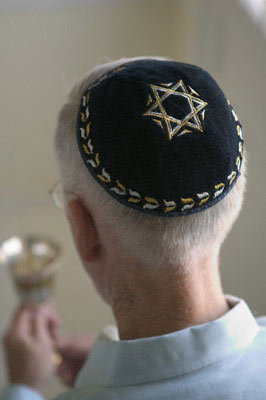By
Reuters
Reuters
Published
Aug 24, 2009
Aug 24, 2009
Palestinian women knit Jewish skullcaps
By
Reuters
Reuters
Published
Aug 24, 2009
Aug 24, 2009
DEIR ABU MESHAL, West Bank (Reuters) - Of all the cottage industries you might expect to find in the Israeli- occupied West Bank, the crocheting of Jewish skullcaps by Palestinian hands seems one of the oddest.
 |
But creating the colourful cap, known in Hebrew as a "kippah", keeps hundreds of women busy in villages like Deir Abu Meshal, which have been making the religious headgear for their Jewish neighbours for some 40 years.
Almost every house in the village of 3,000 west of Ramallah makes the little caps. It's a social event as well as a helpful cash-earner. Women bring their wool and needles to each other's home to crochet and chat.
"We make qors (the Arab name for kippah translates as 'disc') while having a gossip," said Umm Ali. "We meet each other and we make money at the same time," added the mother of three, whose husband is unemployed.
The women make around five caps a day, worth about 12 shekels ($3) each.
"Women here can't sit down without knitting. We've gotten used to it," jokes Ruqaya Barghouthi.
Six Palestinian skullcap dealers distribute the wool, needles and the models to women in this village and 10 neighbouring villages.
The finished articles are collected each week and shipped to Israeli retailers. The skullcaps are also exported to the United States.
"The kippah business is what makes my shop busy. Women buy stuff from the kippah money they earn," said Riyad Ata, whose grocery store serves as a collection point for finished caps from some 100 women.
Observant Jews wear a kippah, which means dome in Hebrew, to cover the head in acknowledgement of the supreme God.
The women of Deir Abu Meshal, known for its traditional dress embroidery, say that to them it's merely a business.
They say they have no qualms about furnishing skullcaps for the people of the occupying power or the Jewish settler, who may be living on Palestinian land.
They say the work is convenient: they don't have to travel.
"Without this knitting business, people here would be very poor," said Nema Khamis, 50, who passed on her skills to her five daughters and daughter-in-law.
Palestinian weavers used to make the traditional keffiyeh, the chequered Arab headscarf that late leader Yasser Arafat made a national Palestinian symbol. But much of that business has now gone to China, where costs are lower.
By Mohammed Assadi
© Thomson Reuters 2024 All rights reserved.

























